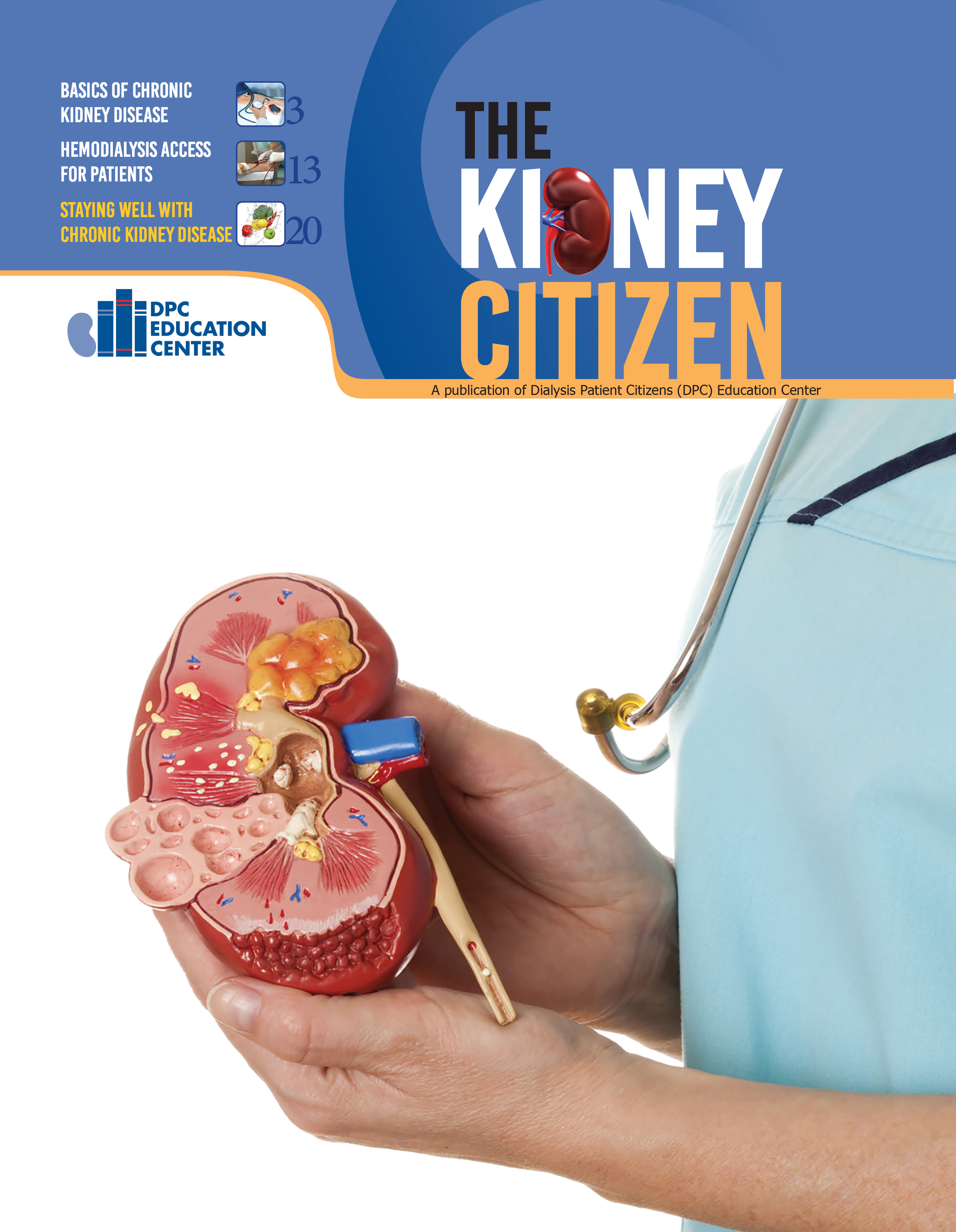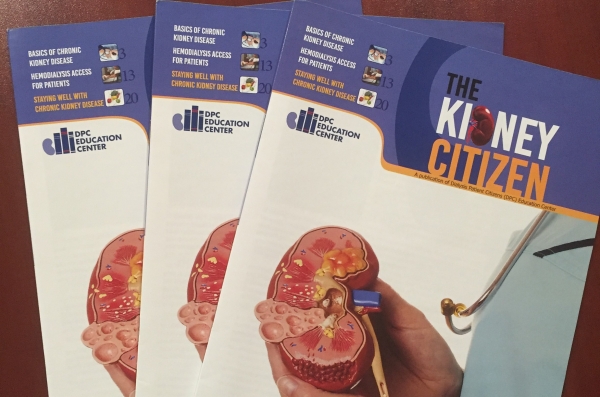News & Events
Discover new information and educational offerings that we provide. Explore our newsletters, blogs and upcoming webinars/conference calls.
Contents:
Report Finds Longer Interval Between Treatments Leads to Increased Hospitalization
The two-day treatment gap between in-center hemodialysis patients is associated with more hospital admissions and an increased mortality rate, according to a report published in Kidney International. Researchers looked at 5,800 hemodialysis patients in Sheffield, United Kingdom. They found that hospitalization was more likely for patients who had a 2-day interval between treatments than those with a 1-day interval. Health officials attributed this to a build-up of fluid and toxins. The study also offered potential solutions, such as more frequent dialysis treatments and a lower fluid removal goal.
September is National Emergency Preparedness Month
As part of National Emergency Preparedness Month, the Kidney Community Emergency Response (KCER) has designated this week Kidney Patient Disaster Awareness week. KCER is offering resources such as information cards and fact sheets on how dialysis patients can prepare for natural disasters. One of KCER’s tips involves putting together supplies for a three-day emergency diet. While it won’t replace dialysis, it will help reduce the effects of being off dialysis for a few days should an emergency occur. KCER recommends stocking bottled or distilled water, foods low in phosphorous, sodium and sugar, and limiting fluid intake. More information can be found on their website. If you want to learn more, you can also listen to a recording of a [...]
Study Examines the Effects of Kidney Donations on Patients
A study by the National Institute of Diabetes and Digestive and Kidney Diseases found that the health of kidney donors did not decline after a three-year period when compared to healthy non-donors. Researchers studied cholesterol levels, blood pressure and protein levels. Two sets of groups, kidney donors and healthy volunteers, participated in follow-up checkups for three years. Scientists found the levels of protein, cholesterol and blood pressure did not differ between the two groups. It was also found that kidney functions in the donor group improved over time, while the healthy group experienced age-related kidney function issues. While the area needs more research, scientists say it is a starting point in studying the effects of living kidney [...]
Report Links Hypertension Medication to Increased Likelihood of Fall Injuries
A recent study finds that elderly patients can have an increased risk of falling after starting a blood pressure medication. Researchers at the University Medical Center in New York studied 90,000 Medicaid patients who experienced fall injuries. Data indicated that patients who began taking hypertension medication had a 36 percent increase in the likelihood of falling within two weeks. Those who were already on blood pressure drugs had a 16 percent chance of falling after starting a new class of medication. The report mirrors another study in the Journal of the American Medical Association, although data in Hypertension contradicts the findings. While the association between falls and blood pressure medications is contested, patients should be [...]
Experts Offer Tips on Care Coordination
Managing health care for a patient with multiple health conditions can involve many medications and specialists. A recent article by Sumathi Reddy in the Wall Street Journal features suggestions for both physicians and patients on how they can help coordinate care. For physicians, suggestions include considering a patient’s other conditions when prescribing medications. For example, if patients are on drugs for hypertension, their doctors should ensure an arthritis prescription won’t affect them negatively. Experts also encourage communication between specialists to help keep each of them updated on a patient’s health. For patients, tips focus on maintaining awareness of one’s health, including bringing a list of medications to appointments and asking doctors any questions they may have about [...]
FDA Increases Focus on Warning Labels for Everyday Painkillers
The Food and Drug Administration is stepping up to improve the warning labels on non-aspirin nonsteroidal anti-inflammatory drugs, or NSAIDS. Studies find that using these medications are linked to an increased risk of heart attack and stroke. The move comes 10 years after warnings were added to prescription pain relievers, but researchers have found that over-the-counter medication also contains risks. Health officials caution patients not to take more than one drug containing NSAIDs at a time and to seek medical attention if they experience symptoms of a heart attack or stroke. Patients should contact their physician with any questions about NSAIDs. Kidney patients in particular should talk to their doctors before NSAID usage, as prolonged [...]
Report Finds Boiling Meat Can Reduce Phosphorous Content
Part of a dialysis diet involves eating foods low in phosphorous. A new study suggests that preparing meat in a certain way can reduce phosphorous levels while still retaining protein. Researchers in Japan experimented with cooking beef, cutting the meat in different ways and switching up the cooking liquid. They found that boiling the meat in a pressure cooker with soft water and discarding the cooking liquid afterward worked the best. Data also suggests using sliced meat, as the high surface area allows the phosphorous to exit easily. For kidney patients, the National Kidney Foundation suggests a daily intake of 10 to 12 mg of phosphorous per gram of protein. For more information on the [...]
The Kidney Citizen Issue 1
The basics of chronic kidney disease, hemodialysis access for patients and guidelines for eating and exercise
Are You Getting Enough High-Quality Sleep?
We all know that sleep is important, yet many of us never seem to get enough of it. The journal Sleep Review recently found that 67% of end-stage renal disease patients said they were impacted by sleep disorders that prevented them from getting enough sleep. These sleep disorders include periodic leg movement syndrome (PLMS), restless legs syndrome (RLS), insomnia and sleep apnea. Researchers from Monash University reported in the journal Renal Failure that lack of sleep, especially when coupled with chronic kidney disease, leads to hypertension (high blood pressure), diabetes, lower quality of life and shorter life expectancy. This leaves many kidney patients wondering how they can get more high-quality sleep. Fortunately, there are several actions you [...]
Bone and Mineral Disease Patient Education Call on June 16
The DPC Education Center will hold an educational conference call on bone and mineral metabolism (BMM) disease on Tuesday, June 16 at 3pm Eastern Standard Time (EST). Chronic kidney disease patients sometimes experience BMM problems, and many dialysis patients also have some form of BMM disorder. If BMM disease is left untreated, you may suffer severe bone pain, joint pain and fractures. In addition, lack of control over minerals in your vascular system increases the risk of heart disease. Dr. Mehul Raval will provide tips on what you can do to help control your phosphorus, calcium and parathyroid hormone levels to reduce the incidence of BMM disease. To participate in the call, dial (877) 399-5186 [...]
Recording of Previous Conference Call on Emergency Preparedness Now Available
We recently hosted an educational conference call/webinar on emergency preparedness with Joan Thomas, executive director of the Kidney Community Emergency Response Coalition (KCER). Thomas discussed tips and tactics for dialysis patients when severe weather and natural disasters strike. Being prepared in such circumstances is important so patients do not miss dialysis. Click here to listen to a recording of the call and view the accompanying Powerpoint slides.
Education Manager & Nephrology Nurse Joanne Smith Provides Education on Treatment Options for Kidney Patients
On April 9, Education Manager Joanne Smith hosted an educational conference call and webinar on treatment options for kidney patients. Smith has been a nephrology nurse for 32 years, and provides in-home training to patients on peritoneal and hemodialysis. Click here to listen to a recording of the call and view the accompanying Powerpoint slides.
The Importance of Scheduling Dialysis Treatments Before Natural Disasters Strike
Since dialysis is necessary to sustain life for end-stage renal disease (ESRD) patients, it is imperative that both facilities and patients plan ahead when it comes to scheduling dialysis. It is particularly important to plan for any facility closures, which are bound to happen during natural disasters like Hurricane Sandy. Unfortunately, approximately 40% of dialysis patients in the regions most affected by Hurricane Sandy - New York and New Jersey - failed to schedule dialysis in the days before the hurricane struck. As researchers pointed out in the American Journal of Kidney Diseases, scheduling dialysis early would have been a good idea because approximately 4.1% of ESRD patients in New York and New Jersey made emergency [...]
Celebrate World Kidney Month
The 10th anniversary of World Kidney Month is drawing to a close! The goal of World Kidney Month is to prevent kidney disease and related diseases from happening, since one adult out of 10 across the world currently has kidney disease. World Kidney Month aims to prevent kidney disease by educating people on the importance of their kidneys. It also aims to raise awareness of high blood pressure and diabetes, the most common causes of kidney disease. Because there are little to no symptoms of kidney disease, most people are not even aware that they have it until it reaches the later stages, including kidney failure. This makes early screenings for kidney disease all the more important. [...]
Join Us for Our Kidney Health Seminar in New York!
On Saturday, March 21 from 2-5pm, the DPC Education Center will partner with the Rogosin Institute for an event that is free and open to the general public. It will cover education and training on topics such as mental health, advocacy and treatment options for kidney disease. It will take place at the Campbell Dome at Queens College – CUNY, located at 65-30 Kissena Blvd, Flushing, NY 11367. If you would like to attend this event, you are required to RSVP by March 17 so we can plan for the event according to the number of expected attendees. To RSVP, call 1-866-877-4242. For more information, contact Kristy Lukaszewski at 1-866-877-4242 or the Rogosin Institute’s Jennifer [...]
Progress on Bloodstream-Associated Infections
With recent changes in dialysis payment, dialysis providers will now be held accountable for reducing bloodstream-associated infections. Research shows that when health care professionals are educated and evaluated on infection control requirements and they follow the recommendations of the Centers for Disease Control (CDC), bloodstream-associated infections can be reduced dramatically. This is why our affiliate, Dialysis Patient Citizens (DPC), continues to remain active with the CDC Bloodstream Infection Collaborative, including organizing patient focus groups to identify how patients can help. The CDC recently announced a 46% decrease in central-line associated bloodstream infections. Bloodstream infections are often preventable, which is why we are working together to help empower patients to ensure they are in control and [...]
Education Center Develops New Patient Education Classroom on Bone & Mineral Disease
The DPC Education Center recently developed an online classroom on bone & mineral disease for dialysis patients. One topic the classroom focuses on is Vitamin D and its many benefits. Vitamin D balances calcium and phosphorus, regulates parathyroid hormone (PTH) production, helps build strong bones, and prevents rickets in children and osteomalacia in adults. Receptors in the kidney turn Vitamin D into its active form, calciferol, but the kidneys of dialysis patients are unable to perform this function. This helps explain why almost all dialysis patients are Vitamin D-deficient. Unfortunately, dialysis patients are often unable to turn Vitamin D from natural sources like the sun into calciferol, so many types of Vitamin D supplements are [...]
Bone Health and Kidney Disease
Bones are living cells made up of collagen, calcium and phosphorous. Collagen is a protein that helps with bones’ flexibility. Calcium and phosphorous make the bones hard and strong. Cells work continuously to remove and replace weak areas of bone throughout life. The kidneys help regulate the phosphorous and calcium levels in the blood in order to keep bones healthy. When kidneys become unable to do their job, the bones begin to weaken. This can lead to joint pain and other health complications. Bones can be kept healthy through exercise and by taking prescribed phosphorus binder medications. These medications reduce the amount of phosphorous the body absorbs by binding to the undigested phosphorus and [...]
Proper Disinfection Practices Can Eliminate The Spread of Ebola
Dialysis facilities have infection control policies and procedures in place to protect their patients and staff from coming in contact with any blood borne diseases, but diligence in following those policies and procedures is imperative to protect us all. Dialysis staff are instructed to treat all patients with standard precautions. These include gloves, masks over the nose and mouth, shields or goggles for eye protection and waterproof gowns whenever there is risk for exposure. Staff should wash their hands and change gloves between every patient to reduce the risk of transmission of any infectious material, in particular blood. You should always advocate for yourself if you do not find that your healthcare workers are using [...]
Nominations Now Being Accepted For World Kidney Day 2015 Reception Honors
Do you know of an exceptional patient or healthcare professional deserving of recognition for his or her contributions to the kidney community? Nominations are now being accepted for the Nancy L. Scott Award for Patient Education & Public Service as well as the Willem J. Kolff Award for Innovation and Exceptional Patient Care. This years winners will be honored at the World Kidney Day Reception coinciding with Dialysis Patient Citizens' annual patient fly-in. About the Nancy L. Scott Award for Patient Education & Public Service Nancy was instrumental in the creation of the DPC Education Center, and has worked tirelessly to empower patients through education. She has also served in numerous Board positions for Dialysis Patient [...]






